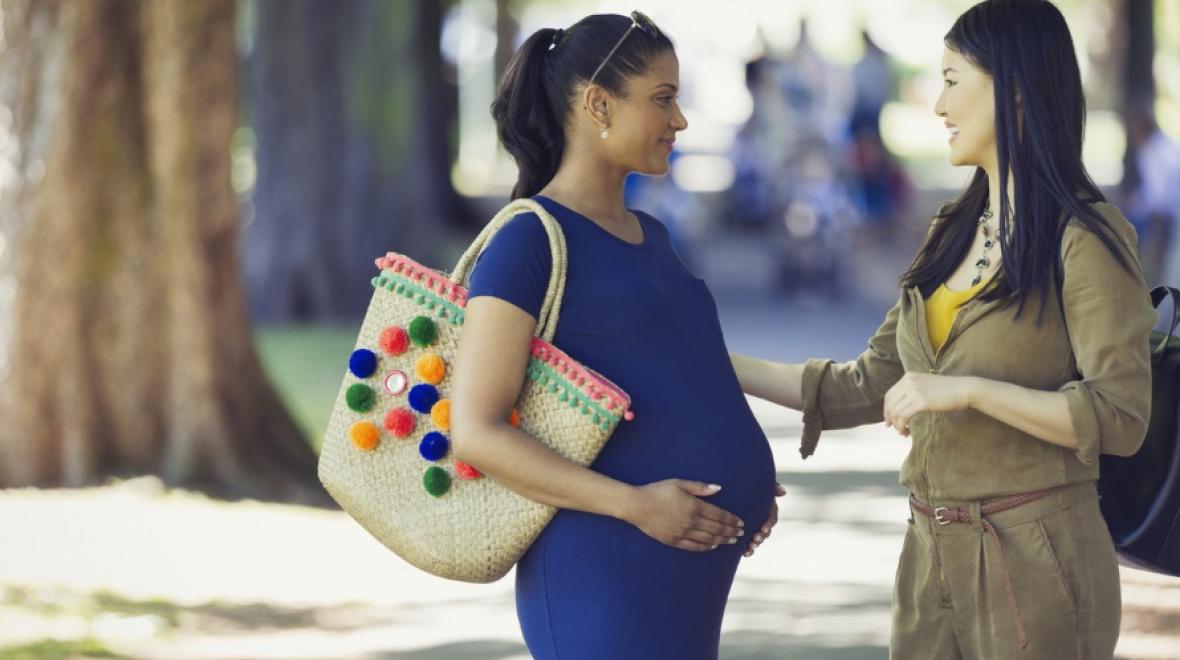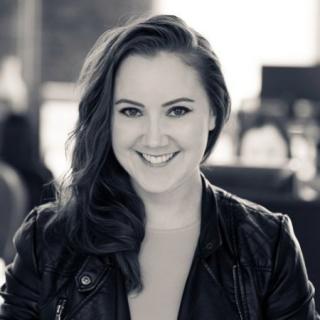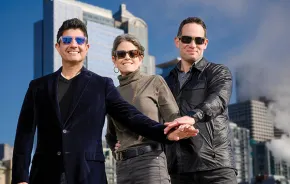10 Things to Never Say to Your Childless Friends

It was 2009 and I had just gotten back from graduating college when my 92-year-old grandfather threw out this humdinger: “Now that you’re done with school, you can settle down and start a family.” I just stared him in the face.
Despite what a nearly century-old man thought “girls of a certain age” were “supposed” to do, I didn’t spend countless time and thousands of dollars on a college education to not put it to use. I was only 22 years old and I had plans. A husband and kids weren’t in the picture.
Since then, I’ve often wondered if children will ever be a part of my plan. A piece of me wants them; another doesn’t. Now that I’m in my 30s, you’d think I would have made up my mind. I haven’t.
What I do know is that, if I do decide to have kids, adoption is my first choice. Because of that, I don’t feel the same kind of age-related pressure that many women who want biological children might feel. And given the independent (translation: single) way I often live my life, most people who know me know not to hound me with questions about when I’ll have kids. In fact, it was my very own mother who correctly predicted many years ago that my brother — six years my junior — would both get married and have children before I did. (Check; check.)
That said, I have been on the receiving end of those questions, and I’m certainly not the only one. Tons of women and some men around my age get these questions and comments on a regular basis. While many of us understand that these interactions are free of ill intent, they’re also annoying as hell.
I spoke to people without kids about the comments they hear most. Their experiences range from innocuous yet irritating to presumptuous statements about life goals. For others, the questions are invasive, offensive and emotionally challenging, opening up old wounds.
So, dear reader, don’t be that person. Here are 10 things you should never say to those without kids.
“When will you finally have kids?”
This seems innocent, but you don’t always know what’s going on with the person in question. Maybe they’re perfectly happy being child-free or maybe they’re struggling with health concerns or a miscarriage or maybe there’s another reason entirely.
Thirty-year-old Angeline of Seattle is her household’s sole income earner while her husband finishes school. “Although we plan on having kids someday, we don’t have the time or money to raise a child right now,” she says. “It pisses me off when people dismiss that as an excuse. The decision to have children is one I take seriously, and we’re not going to do it until we’re ready.”
“Why don’t you have kids?”
For many I spoke to, this is one of the most harmful questions, as it comes with the assumption that everyone can get pregnant. Brittany, 30, from New Orleans, has been married since 2014 and desperately wants a child, but the process hasn’t been easy.
“I feel compelled to tell people my personal business, as if I’m defending myself,” she says. “It’s annoying and painful because I do want children. It may happen that we don’t, if things turn out that way. That will be hard enough for us to accept. Thinking about the questions bound to follow in that case is incredibly anxiety-inducing for me.”
Adds Matt, 30, from Seattle: “I’m not sure why people feel it’s okay to ask about personal choices like having kids. It’s not like I’d ask someone whether they were having lots of unprotected sex. But the honest answer is I don’t know if I’ll ever have kids of my own because cancer ate one of my testicles.”
“I’m sorry.”
Plenty of people don’t have kids and never want them, but they’re constantly met with looks of sadness and sympathy. Katie, a 39-year-old living in Boston, says it makes her want to scream.
“Everyone jumps to the conclusion that I must have wanted kids but struggled with infertility or never found the right guy,” she says. “None of those are things are true. As a matter of fact, the right guy also didn’t want kids.”
Katie has an immediate (if unsaid) thought when she encounters pity for not having kids. “Yeah, you should be sorry,” she thinks, “for making baseless assumptions about me, my wants, my relationship and my uterus.”
“You’ll change your mind.”
While it’s true that people change their minds — my mom did, even after marrying my dad on the agreement that they weren’t having kids — it’s no one's responsibility to share what they’ll want in the future.
Melissa, 39, from Seattle, has been told to freeze her eggs for when she undoubtedly “change[s] [her] mind.” Minh, 31, also from Seattle, once battled off a male coworker who spent 30 minutes trying to convince her that her choice wasn’t final. “I used to feel bad about having to justify my decision,” Minh says. “But now I just keep repeating ‘I don’t want any’ until the person goes away.”
She tries to steer the conversation in a direction that’s less about her as an individual and more about the way society views having children as some sort of requirement. “I try to point out the consequences of having kids just because it’s what everyone is doing or when you’re not actually fit to be a parent,” she adds. “The human race is not going extinct, so we should focus on raising quality humans versus quantity.”
“But you’d be such a great mom/dad!”
While the sentiment is lovely, it doesn’t change a thing. Just because someone has shown what you see to be parenting instincts or has even had fun with your own kids, that doesn’t mean they want their own.
Ruby, a 30-year-old living in Ontario, has heard this sentiment multiple times and, in fact, views it as a compliment. However, the sentiment undermines her personal priorities: “I’d like to hear it replaced with ‘You’d be such a great boss.’”
“You won’t be fulfilled as a woman unless you have kids.”
For many, having kids is incredibly important, maybe even necessary, to their happiness. But for others, myself included, parenthood is not the be-all, end-all.
Rachel, 33, from Seattle, is perfectly happy with her life as is. “I value my sleep and I enjoy putting myself as no. 1,” she says. “Plus, I run my own business, which is essentially my baby. My partner and I also question [the wisdom of] bringing a child into this political climate.”
What’s more, there’s the added implication that motherhood gives you superpowers. “My child-having coworkers say things like, ‘Once you’ve had three kids, you can handle anything,’” says Jade, 35, also from Seattle. “I know they don’t mean anything by it, but there are ways to be resilient even if you have zero kids.”
For Amber, 37, from New York, it comes down to the way society so narrowly defines womanhood. “Who are you to define womanhood for all of us like that? Why are you so intent on limiting what it means to be a woman to one set of experiences?”
“I didn’t think you’d want to come. It’ll be all parents and kids.”
As a single woman with several close friends who are married, this is one I worry about when they start having kids. Maybe they think they’re sparing me a boring afternoon, but I don’t want my friend time to diminish because I don’t have kids. Not to mention, if we’re celebrating a close friend’s child, you better believe Aunt Jager wants to party.
“When your friends start having children, it’s easy to begin feeling like an outsider,” says Lauren, 27, from Mercer Island, Wash. “For that reason, I’ll always appreciate an invite to a child’s birthday. If I don’t want to go, it’s up to me to say no. But for a true friend, I’ll be there. If they matter to me, then their child matters to me... whether or not I want kids of my own.”
“You wouldn’t understand because you don’t have kids.”
This is one parents use to shut down a conversation on a wide range of topics, from scheduling and fatigue to finances and politics. Often, it invalidates a person’s feelings or lifestyle just because they don’t have kids.
Those of us without kids won’t deny that parenthood gives you a new perspective, but does that mean we deserve to be forced into a game of one-upmanship? Comments like these are belittling because most of us are capable of comprehending and even sympathizing with a situation or feeling, even if we haven’t experienced that exact same thing for ourselves.
Riya, 35, from Seattle, recently found herself in this situation and felt incredibly hurt by the “no kids card.” “I don’t even know if I can have kids,” she says. “That doesn’t mean I don’t know anything about them. How dare they make that assumption.”
For me, I’ll always understand when a friend turns to another parent to talk about kid-related things, but I can still be there to listen. I want to hear about what’s important in their life, and I hope they feel the same toward me.
“You won’t know real love until you have kids.”
To put it bluntly, this comment is demeaning and incredibly invalidating. I may not fully be able to empathize with the all-consuming love that many parents feel, but I do know what it means to love.
Even 31-year-old mom Claire of Brooklyn finds this rude. “I had more than one person tell me before getting pregnant that I wouldn’t understand ‘real love’ or ‘my true capacity for love’ until I had a child of my own,” she says. “I found that really offensive. Like I didn’t have the capability of loving someone ‘enough’ without giving birth first.”
Not to mention: It’s absolutely no one’s job to define what loves means to another person.
“Not having children is selfish.”
I don’t know the completely self-sacrificing feeling of parenthood, but I and my child-free friends have the same right as everyone else to live life as they choose. Those choices don’t mean that we’re living our lives in insanely indulgent ways, either.
Plus, it’s not like the ability to act selflessly kicks in just because you have kids. “As a survivor of child abuse who works with children in the foster care system, I know that there isn’t some magic selflessness switch that gets flipped when you have kids,” Amber says. “And I know a lot of people without children who are incredibly selfless and loving toward their friends, family and even strangers.”
What it ultimately comes down to for Amber is a frustration with people “who feel the need to categorize their choices as ‘right’ or ‘normal’ and impose them on others.” Personally, I think we can all learn to be more understanding and compassionate. Parent or not, we could all use a little work.
Editor’s note: This article was originally published in December 2017. Last names have been removed throughout for privacy.











